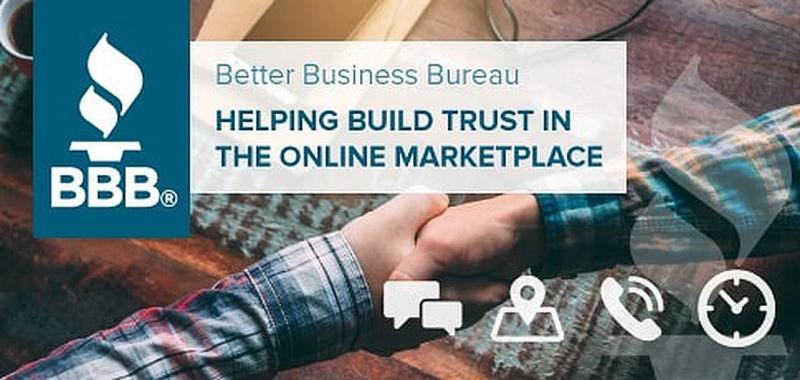Should your business join the Better Business Bureau?
Deciding whether your business should join the Better Business Bureau (BBB) involves considering several factors and weighing the potential benefits against the associated costs. Here are some considerations for businesses when deciding whether to join the Better Business Bureau:
Potential Benefits:
Credibility and Trust:
- BBB accreditation can enhance your business's credibility and trustworthiness in the eyes of consumers. Some customers actively seek out BBB-accredited businesses as a sign of commitment to ethical practices.
Consumer Confidence:
- Being a part of the BBB can instill confidence in potential customers. It shows that your business is willing to adhere to certain standards and is open to resolving any issues that may arise.
Mediation Services:
- The BBB provides a platform for mediating disputes between businesses and consumers. This can be beneficial in resolving issues before they escalate and demonstrating a commitment to customer satisfaction.
Positive Online Presence:
- BBB accreditation often includes a profile on the BBB website, which can contribute to a positive online presence. This profile may include information about your business, customer reviews, and ratings.
Educational Resources:
- Your business can benefit from the educational resources and best practices offered by the BBB. This information can help you stay informed about consumer expectations and industry standards.
Considerations and Drawbacks:
Membership Fees:
- Joining the BBB typically involves paying membership fees, and the cost can vary based on factors such as the size of your business and location. Consider whether the investment aligns with your budget and business goals.
Voluntary Nature:
- BBB accreditation is voluntary, and not all businesses choose to join. Some businesses may question the necessity of paying for accreditation, especially if they already have a strong reputation.
Local BBB Variation:
- The effectiveness and reputation of local BBB chapters can vary. It's important to assess the credibility and impact of the specific BBB chapter relevant to your business location.
Other Credibility Factors:
- BBB accreditation is just one indicator of credibility. Businesses should also consider other factors, such as industry certifications, customer testimonials, and online reviews, when building and showcasing their reputation.
Consumer Perception:
- While many consumers value BBB accreditation, some may not be familiar with its significance. Consider whether your target audience places a high value on BBB accreditation and if it aligns with your brand image.
Commitment to Ethical Practices:
- If your business is not committed to ethical practices and customer satisfaction, joining the BBB may not be as beneficial. BBB accreditation is a commitment to certain standards, and businesses should be prepared to uphold them.
Steps to Consider:
Research Your Local BBB:
- Investigate the reputation and effectiveness of the local BBB chapter relevant to your business. Different chapters may have varying levels of influence and consumer recognition.
Assess Your Budget:
- Consider whether the membership fees align with your budget and whether the potential benefits justify the cost. Evaluate the return on investment in terms of increased consumer trust and potential business opportunities.
Evaluate Your Reputation:
- Assess your current reputation and whether BBB accreditation would significantly enhance it. If your business already has a strong reputation, you may weigh the benefits differently than a business seeking to build credibility.
Consider Your Target Audience:
- Understand your target audience and whether they actively seek out BBB-accredited businesses. If your customers place importance on such accreditation, it may be a valuable investment.
Review the Accreditation Standards:
- Familiarize yourself with the BBB's accreditation standards to ensure that your business can meet and maintain them. These standards typically relate to ethical business practices, transparency, and responsiveness to customer concerns.
Ultimately, the decision to join the Better Business Bureau depends on your business's unique circumstances, goals, and values. Weigh the potential benefits against the costs, and consider how BBB accreditation aligns with your overall business strategy and commitment to customer satisfaction.
Sure, here is a detailed analysis of the benefits, costs, and requirements of BBB membership for businesses:
1. Evaluating the Benefits of BBB Membership: Assessing Potential Advantages for Businesses
The Better Business Bureau (BBB) is a non-profit organization that provides a range of services to businesses, including accreditation, dispute resolution, and consumer education. BBB membership can offer several potential advantages for businesses, including:
Enhanced Reputation: BBB accreditation can enhance a business's reputation and credibility, making it more attractive to potential customers. Studies have shown that consumers are more likely to trust and do business with BBB-accredited businesses.
Reduced Risk of Lawsuits: BBB accreditation can help businesses reduce their risk of lawsuits by demonstrating their commitment to ethical business practices. A study by the BBB found that BBB-accredited businesses are 30% less likely to be sued than non-BBB-accredited businesses.
Increased Customer Satisfaction: BBB membership can help businesses improve customer satisfaction by providing them with access to dispute resolution services and consumer education resources. A study by the BBB found that BBB-accredited businesses have a 94% customer satisfaction rating, compared to 82% for non-BBB-accredited businesses.
Access to Networking Opportunities: BBB membership provides businesses with access to networking opportunities with other businesses and community leaders. This can help businesses expand their reach and build relationships with potential customers and partners.
2. Understanding the Costs and Requirements of BBB Membership: Identifying Financial Obligations and Responsibilities
While BBB membership can offer several potential benefits, it is also important to consider the costs and requirements involved. The costs of BBB membership vary depending on the size and type of business. However, all BBB members are required to:
Pay an annual membership fee: The annual membership fee is based on the business's revenue and number of employees.
Adhere to the BBB's Code of Business Ethics: The BBB's Code of Business Ethics outlines the principles that businesses are expected to uphold.
Cooperate with BBB investigations: Businesses are required to cooperate with BBB investigations if they receive a complaint from a consumer.
Resolve disputes with consumers: Businesses are encouraged to resolve disputes with consumers amicably through the BBB's dispute resolution process.
Making an informed decision about BBB membership: Weighing the pros and cons based on specific business needs
The decision of whether or not to become a BBB member is a business decision that should be made on a case-by-case basis. Businesses should carefully consider the potential benefits and costs of BBB membership in light of their specific needs and goals.
Some businesses that may benefit most from BBB membership include:
Businesses that interact directly with consumers: Businesses that sell products or services directly to consumers are more likely to benefit from the enhanced reputation and credibility that BBB membership can provide.
Businesses in competitive industries: Businesses that operate in competitive industries may find that BBB membership can help them differentiate themselves from their competitors and attract more customers.
Businesses with a history of complaints: Businesses that have a history of complaints from consumers may find that BBB membership can help them improve their reputation and restore customer confidence.
Businesses should also consider the following factors when making their decision:
The size of the business: Larger businesses may find that BBB membership is a more worthwhile investment than smaller businesses.
The business's financial resources: Businesses should be able to afford the annual membership fee and the costs of adhering to the BBB's Code of Business Ethics.
The business's commitment to ethical business practices: Businesses that are already committed to ethical business practices will find that BBB membership is a natural fit.
By carefully weighing the pros and cons of BBB membership, businesses can make an informed decision that is right for their organization.












